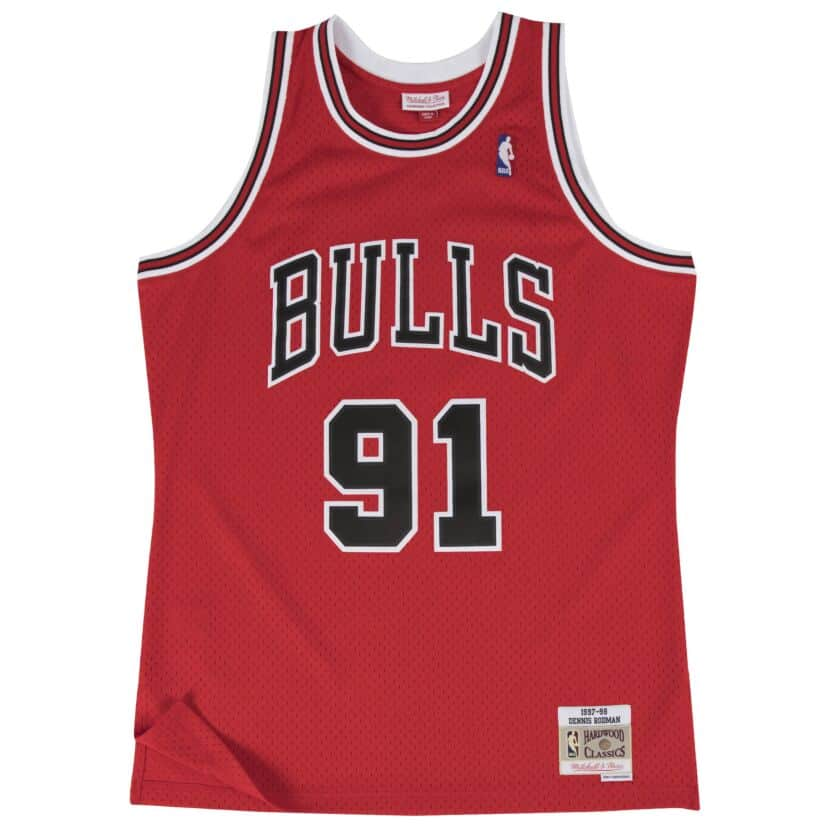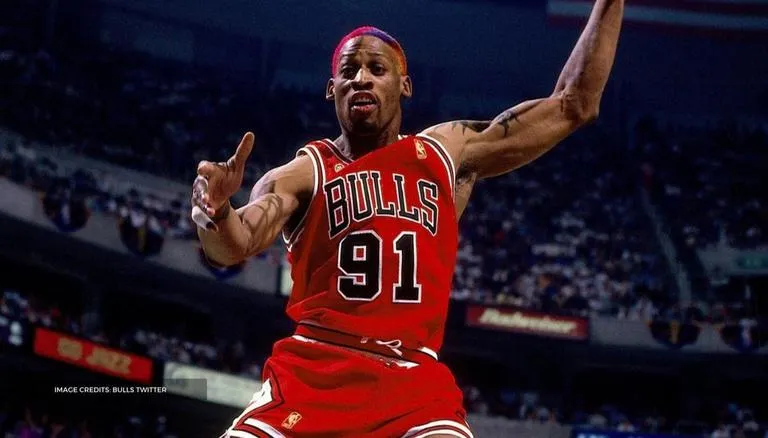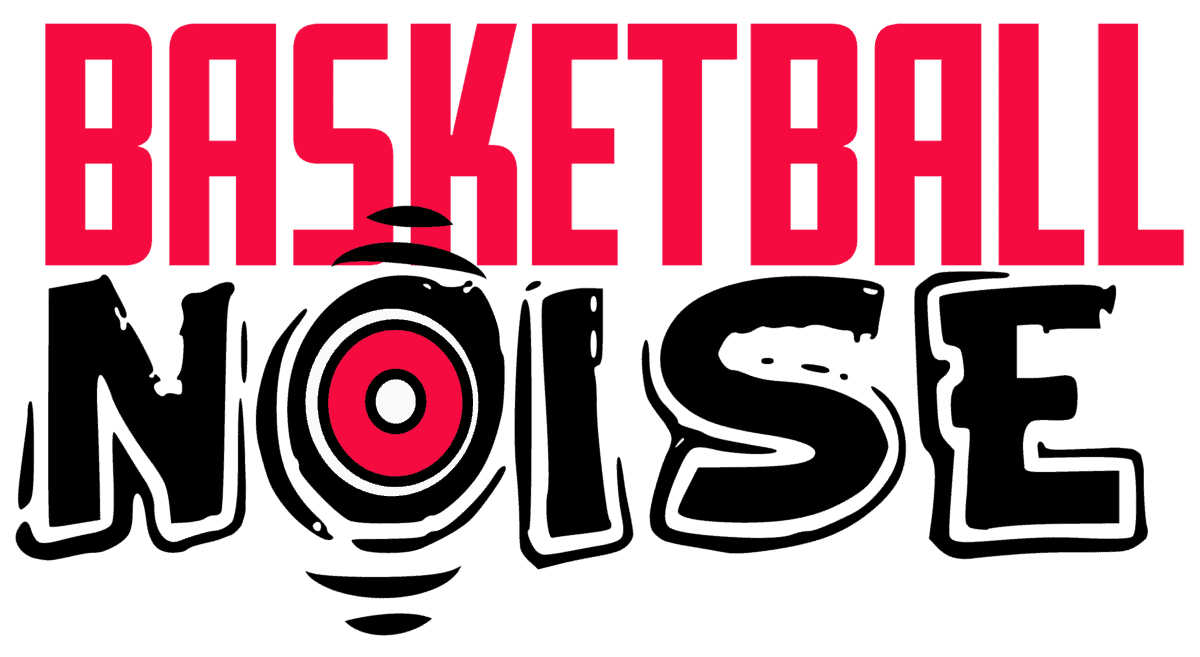The Chicago Bulls were on top of the world in the 90s, winning multiple championships and popularizing the NBA and basketball around the world. Michael Jordan was not the only one in the spotlight; nearly every notable member of the Bulls organization was thrust into fandom and increased scrutiny. However, there may have been only one player who may have made more headlines than MJ himself.
What is the 9th most iconic jersey of all time? According to the “Top 75 Greatest Jerseys of All Time” list compiled by SLAM Magazine, the 9th most iconic jersey of all time is the 1997-1998 Dennis Rodman Chicago Bulls away jersey. The jersey has a red base with black letters and numbers, and has a red, white, and black collar and armpit trim. Mitchell & Ness, which is a jersey manufacturer, has revealed that this jersey is their 9th best-selling jersey of all time.

Why is Dennis Rodman iconic?
Dennis Rodman had an unconventional career leading up to the NBA. He worked as a janitor before playing and dominating in the NAIA, a college athletics association that is much smaller than the NCAA. He declared for the 1986 NBA Draft and was selected by the Detroit Pistons in the 2nd round. After winning 2 championships with the “Bad Boy” Pistons, Rodman had a pivotal moment in his personal life that led him to demand a trade. He joined the San Antonio Spurs in 1993, but clashed with teammates, coaches, and the front office, and was traded to the Chicago Bulls for the 1995-1996 season. With the Bulls, Rodman won another 3 championships, all consecutively, cementing his legacy in the league. 2 short stints with the Los Angeles Lakers and the Dallas Mavericks later, Rodman never managed to make his way back to the NBA, although he played for several international sides over the years.
Rodman was an excellent rebounder of basketball, both offensively and defensively. Rodman had a career average of 13.1 rebounds per game, with two straight seasons where he grabbed more than 18 rebounds per game. Rebounding the ball was his primary offensive responsibility, as he only ever averaged more than 10 points a game once in his career; his career scoring average was 7.3 points per game. Along with defensive rebounding, Rodman was a lockdown defender, who could guard any position. His resume includes 5 NBA titles, 7 rebounding titles, 2 Defensive Player of the Year awards, and 7 All-NBA Defensive First Team selections. Despite being incredibly effective at what he did, Rodman was essentially a role player; he was only ever selected to 2 All-Star Games and 2 All-NBA Third teams. However, his talent was undeniable and his contributions were invaluable, and he was inducted into the Hall of Fame in 2011.
Rodman’s iconic status was not due to him being a rebounding and defensive prowess, but of his larger than life persona. Rodman was not a stranger to technical fouls, suspensions, and fights on the court. His beefs spilled over to include coaches, referees, front office executives, and even one unfortunate cameraman. He sported wild hairstyles, tattoos, and piercings that the league (and the fans) weren’t ready for. He had high-profile relationships with celebrities, and married himself to promote his autobiography. Rodman’s list of antics and wild behaviors are quite long, which have infuriated and enchanted many; despite whatever one may think of him, Dennis Rodman is a truly iconic figure, and a very good basketball player as well.
Why is the 1997-1998 Dennis Rodman Chicago Bulls away jersey iconic?

Dennis Rodman was 37 years old during the 1997-1998 season, fast approaching the end of his career. However, his rebounding and defensive prowess were as strong as ever; Rodman averaged 15 rebounds a game, including a season-high 29 rebounds against the Atlanta Hawks. While injuries nagged him, Rodman put up a strong defensive performance against Karl Malone and the Utah Jazz in the NBA Finals. Rodman’s off-court antics continued, including a highly criticized move to go wrestling with Hulk Hogan during the NBA Finals. But Rodman didn’t let the criticism get to him, as he and the Bulls closed out the series 4-2 to complete the 3-peat and get Rodman’s fifth and final ring.
Why is the 1997-1998 Chicago Bulls away jersey iconic?
The 1997-1998 Chicago Bulls away jersey has a red base with black “Bulls” lettering and black numbers. The collar and armpit trim are red, white, and black. The simplicity of the jersey has stuck with fans, who associate the jersey with the iconic 90s Bulls dynasty. The Bulls were rife with tension throughout the offseason, particularly Scottie Pippen and coach Phil Jackson, who had rifts with the Bulls front office. The tension, along with injuries, had a part to play in the slow start to the season, but Michael Jordan and Co. got hot in the latter part of the season. The momentum carried them all the way to the NBA Finals, where they won their 6th title since the start of the decade. It was also their last, as Jordan retired, and Phil Jackson, Pippen, and Rodman all left the franchise. It’s why the 1997-1998 edition of the Bulls away jersey is bittersweet for many, as it was the “Last Dance” for the dynasty.
What other notable players wore the 1997-1998 Chicago Bulls away jersey?
The 1997-1998 Chicago Bulls roster was made up of what would be the last remnants of the 90s dynasty, many of whom won multiple titles and spent long years with the franchise. Notable players to wear the 1997-1998 Chicago Bulls away jersey include Michael Jordan, Scottie Pippen, Steve Kerr, Luc Longley, Bill Wennington, Ron Harper, and Scott Burrell, and Toni Kukoč.
Dennis Rodman would get as much media coverage as many Hollywood stars did, but he always showed up and did his job on the court. Not only did he know his role, he excelled in it, and reveled in it. While many people around the world will remember him for his drama, he is also deservedly remembered for being the ultimate role player.
